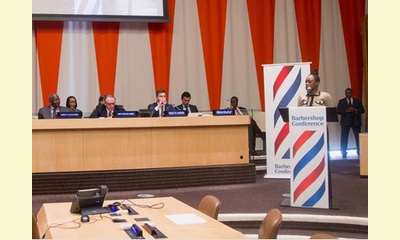|
|
UN ‘barbershop’ conference aims to dispel stereotypes, promote gender equality
un articulo por UN News Centre (abridged)
Looking to promote change in how men and boys think and
talk about women’s empowerment and gender equality, the
United Nations is hosting at its New York Headquarters a
two-day high-level “Barbershop” event, which this
afternoon [15 January] focused on initiatives that aim to
support non-sexist male attitudes and behaviours between
men. 
The Barbershop Conference. UN Photo/Devra Berkowitz
click on photo to enlarge
The Barbershop Conference aimed at reflecting the casual
setting in which men get their hair cut, while delving deeper
into gender stereotypes perpetuated by social norms, and
helping dispel the fallacy that women and girls cannot be
equals in the economic, social or political life.
The event also highlighted that while historically women
and girls have led the fight against gender inequality,
discrimination and gender-based violence, the recent UN
HeforShe initiative encourages men and boys to stand at
forefront of the global discourse.
“Today’s Conference is a creative way of moving the
dialogue into uncharted territory,” said Sam Kutesa,
President of the UN General Assembly, who was joined at
the event by UN Deputy Secretary-General Jan Eliasson,
Executive-Director of UN Women Phumzile Mlambo-
Ngcuka, several UN Ambassadors, Ministers, civil society
representatives, journalists, and activists, as well as
entertainers.
“Increasingly, the world has come to recognize that
achieving gender equality will require the active
participation of all segments of society and that men and
boys have a critical role to play,” said Mr. Kutesa, noting
that he was happy to add his voice to the Barbershop
initiative and also make the empowerment of women and
girls a key priority of his General Assembly session.
Among other things, the initiative aims to supports non-
discriminatory and non-sexist male attitudes between men,
commit to discussing the role of men in realizing gender
equality within the UN, and further engage men to end
violence against women and girls.
“This must be the biggest barbershop conversation ever,”
Deputy Secretary-General Jan Eliasson said, emphasizing
that today’s discourse came at an opportune time to “jolt
our thinking” as the world prepares to marks the 20th
anniversary of the Beijing World Conference on Women,
held in 1995. . .
Closing the first day of the conference, the head of UN
Women, Ms. Mlambo-Ngcuka, said today’s Barbershop is
about breaking social norms that oppress women and
restrict men and boys. And the HeforShe campaign is
about both men and women getting outside of their comfort
zone.
“It is not enough to be a good boy and a good man in a
bad system. Our challenge is to change the system
because a bad system will always bring a good man
down,” she said.
“We’re in this for the long-haul.” Ms. Mlambo-Ngcuka said,
underscoring that the post 2015-framework must create a
world that will be totally different by 2030. “We are asking
you to stand up and speak out so that you can create more
Barbershop conversations of this nature.”
|








|
DISCUSSION
Pregunta(s) relacionada(s) al artículo :
What role should men play to stop violence against women?,
* * * * *
Comentario más reciente:
No More Steubenvilles: How To Raise Boys to be Kind Men
What can we do to help young men respect women, recognize consent, and have healthy sexual relationships? Teach them kindness to others—and the courage to go against the crowd.
by Kim Simon
posted Mar 18, 2013
When Max was just a few months old, I sat cross-legged on the floor with him in a circle of other mothers. The facilitator for our “Mommy and Me” playgroup would throw a question out to the group, and we would each volley back an answer.
“What quality do you want to instill in your child? What personality characteristic would you most like for your son to be known for?” she asked.
One by one, the mothers answered. “Athletic”, “Good sense of humor”, “Brave”, “Smart”, “Strong”.
The answers blended together until it was my turn to speak. I looked down at the tiny human wiggling around on the blanket in front of me, his perfectly round nose, his full lips that mirrored mine. I stroked the top of his very bald head, and said with confidence: “kind”.
I want my son to grow up to be kind.
The eyes of the other mothers turned toward me. “That’s not always a word that you hear used for boys” one said. “But yes, you’re right … so I guess, me too”. At the end of the day, we wanted our tiny, fragile, helpless baby boys to grow up to be kind. . ... continuación.

|
|









